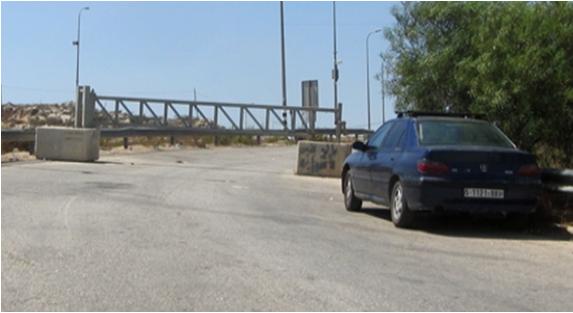On August 11 of this year, the Israeli military shut and locked the gate it had installed some six years earlier accessing the main entrance to Kafr ad-Dik, a Palestinian village west of Salfit in the central West Bank, to prevent passage by vehicles. According to the village council, the Israeli soldiers justified the closure by alleging that youths from the village had repeatedly thrown suspicious objects and Molotov cocktails at Route 446, which is used by settlers.
Approximately 6,500 people live in Kafr ad-Dik. Some 200 are employed in settlements north of the village – particularly Alei Zahav, Pedu’el and Bruchin – and another 500 or so are employed in civil service in Ramallah.

The gate accessing the main entrance to Kafr ad-Dik, which the Israeli military casually closed for 40 days, disrupting the lives of the village’s residents (Photo: B’Tselem)
The village has four entrances. The main entrance, which was closed off by the gate, lies on the northwest side of the village and leads to a road that connects to Route 446 – a highway. Another entrance, to the northeast, leads to a road that passes through the village of Bruqin and serves as the residents’ alternative route. Two other roads – one to the south, leading to Deir Ghasana and other villages, and a narrow and run-down road to the east that also leads to Bruqin – are rarely used.
The closure of the gate forced residents to take the alternative route, which is narrow and weaves between the houses of Bruqin, adding nine kilometers to their journey. Those who work in the settlements to the northwest had to park their cars by the gate and walk about a mile or drive along a lengthy detour, incurring extra fuel costs or higher taxi fares for those who do not own a car.
On September 7, the military opened the gate, only to close it again the next day without offering any explanation to the residents. On September 21, the military re-opened the gate without any prior notice. It has remained open since.
According to B’Tselem: “For 40 days, the military casually disrupted the lives of thousands of people who were not suspected of committing any offense. This collective punishment is part of a policy in which the military cynically abuses its power to harass Palestinians. There can be no moral or legal justification for this conduct.”


